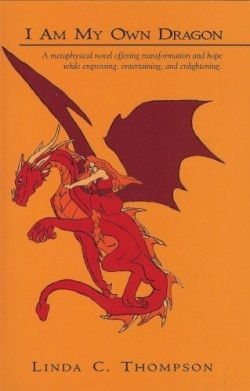I Am My Own Dragon
Lucy March has made mistakes; she tells readers so on the first page of this fictional memoir. But it’s all too easy to see how she came to make them. In conversational style (the reader is addressed as “you” in asides that wax metaphysical) she shares insights and emotions with the reader as if in an actual two-way conversation asking questions and inviting responses.
Beginning as a coming-of-age story I Am My Own Dragon quickly relates Lucy’s early history and difficult home life. Then it bumps along through her mistakes as she exceptionally bright manages to be quite dim about her choices in men and living. After she refuses to pick up a drunken boyfriend at a bar she learns he’s been killed in a head-on collision while driving drunk. Thus bereft she begins college and soon settles into a live-in relationship with a boyfriend from her home town.
Thomas treats her poorly and indeed seems to have a pretty poor opinion of humanity in general. Neither behaves well although Lucy at least has the grace to feel bad about her treatment of others. But nothing can prepare her for the night Thomas rapes her and soon thereafter she enters therapy. A couple of false starts with therapists who do not help her lead her to Joanna who becomes more three-dimensional than any character other than Lucy. And at this point the book changes substantially.
Lucy’s relationship with Joanna seems to be more than that of patient and therapist; Joanna takes Lucy’s case home with her in a number of ways and seems to gain as much therapeutic value from their sessions as Lucy herself does. She even relates Lucy’s therapy to her own marital difficulties using Lucy’s sessions and progress as a key to the resolution of her own problems.
In the book’s second part Lucy undergoes a transformation as dramatic as it is startling. Becoming involved with a new group of friends one of whom is gay she begins to self-nurture and very tentatively explores a lesbian relationship. She also learns through her therapy to understand what people need from each other and gradually builds a thriving career on this ability investigating New Age techniques even as she incorporates them into her workshops on team building. Like a butterfly emerging from a cocoon she struggles through her earlier adversities to blossom into a new being who can heal those around her.
The author’s prose flows although from time to time it’s difficult to tell whether Lucy or Joanna is speaking. There’s a fair amount of head-hopping between the two. The story doesn’t flow as smoothly as the prose changing course abruptly in part two and then ending in a totally bewildering way—almost as if the writer wanted to jolt the reader out of complacency. When reviewed in manuscript form the book needed copy editing but the voice is clear and literate.
Readers will enjoy some parts of the story more than others but this writer shows promise.
Reviewed by
Marlene Satter
Disclosure: This article is not an endorsement, but a review. The publisher of this book provided free copies of the book and paid a small fee to have their book reviewed by a professional reviewer. Foreword Reviews and Clarion Reviews make no guarantee that the publisher will receive a positive review. Foreword Magazine, Inc. is disclosing this in accordance with the Federal Trade Commission’s 16 CFR, Part 255.

